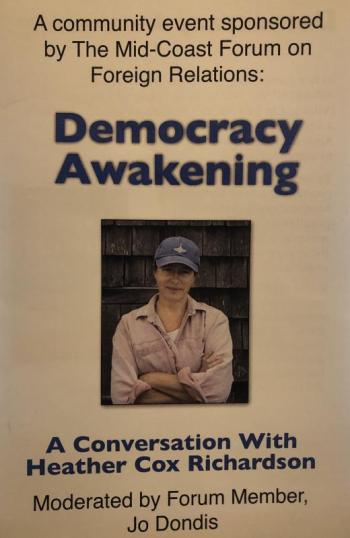Camden Opera House fills to capacity for conversation with Heather Cox Richardson

CAMDEN — Any era in human history can be fraught with social and political tension, but these days we are on overload, not just with information and tense opinion, but with discord and violence. It is hard to find perspective, but some voices cut through the clutter, including historians who provide us with context – how did we get to our present set of circumstances, and why.
Saturday evening, Feb. 10, the Mid-Coast Forum on Foreign Relations convened a meeting at the 500-seat Camden Opera House — its 464th since 1983 – to focus on the history of recent political transitions and trends that have positioned the U.S. and its democracy to its current state of being.
The Forum had invited Boston College history Professor Heather Cox Richardson for a formal conversation in October, but that event had been cancelled following the Oct. 25 mass shootings in Lewiston.
Richardson’s talk was rescheduled to Feb. 10, and Opera House seats were claimed almost immediately when area residents learned she was going to appear.
The conversation was built on Richardson’s 2023 book, Democracy Awakening: Notes on the State of America. In that book, she explained, according to the Forum, “how a small group of wealthy people have made war on American ideals, leading us down a dangerous path to authoritarianism.By weaponizing language and promoting a false history, they have created a disaffected population and then promised to recreate an imagined past where those people could feel important again. Richardson argues that taking our country back starts by remembering the elements of the nation’s true history that marginalized Americans have always upheld — their dedication has sustained our democracy in the past and can be a roadmap for our future.”
“There’s nothing more central to the conduct of foreign policy than the health of our democracy,” said Mid-Coast Forum on Foreign Relations current President George Look, at the evening’s outset.
The Forum was organized in 1983, with members and guests meeting monthly to talk with guest speakers — whether that be a former National Security Agency director, U.S. ambassador to Russia, or journalist — familiar with U.S. foreign policy and its influencing factors.
“From its inception, the Forum has considered all aspects of foreign relations as they affect our national life and has encouraged wide-ranging discussions to air disparate views in the best tradition of our American democracy,” the Forum says.
Heather Cox Richardson, who lives in Maine, is recognizable not just for her books and podcast, but her almost-daily Letters from an American, which is circulated to now a subscriber list of 1.3 million. She also posts it on Facebook, where there she has 1.7 million followers. In her letters, she provides insight to the, “history behind today’s politics.”
“People often think I am a journalist and I get included in journalist packs when they go places,” said Richardson, at the outset of her Feb. 10 talk. “But it is important to remember that journalists and historians are trained very differently.”
Journalists tell you what happened, she said.
“That’s their job,” she said. They have scoops, they have contacts, they have people who can tell them the latest things about to drop because something has just happened. They are trained to get that information and get it to you very quickly.
“Historians, however, are are trained to tell you how and why society has changed,” she said.
“We learn to use those sources journalists provide, that photographers provide, that films tell you about, that documents or any of the things that people leave behind them,” said Richardson. “We are trained to look at that, understand how they interact, and how they interact theoretically in order to change society. Different historians think different things change society. Some people think it is economics, some people think it is religion, some think it is great men. I happen to be somebody who thinks ideas change society.”
Richardson received a loud, enthusiastic welcome, and at the end of a hour-long conversation, a standing ovation. Maine Gov. Janet Mills had attended the evening, and was last of those in the audience with a question for Richardson. Mills asked her to comment on the issue of abortion, the Dobbs decision by the U.S. Supreme Court, and its relevance in current political campaigns.
“Isn’t that going to become a dominant issue in this campaign, not just for the presidency, but all down the ballot,” asked Mills.
HCR noted the, “sheer disrespect of that decision for women in the United States has created this movement.”
That movement includes empowerment of women in government across the globe, and which is correspondingly accompanied by misogyny.
“That is the moment we are in now, and it is real touch and go, but is it salient? I think it is foundational,” said Richardson. “Because it is not even just about abortion. It is about whether or not we are going include women as equals in American society.
Reach Editorial Director Lynda Clancy at lyndaclancy@penbaypilot.com; 207-706-6657

























